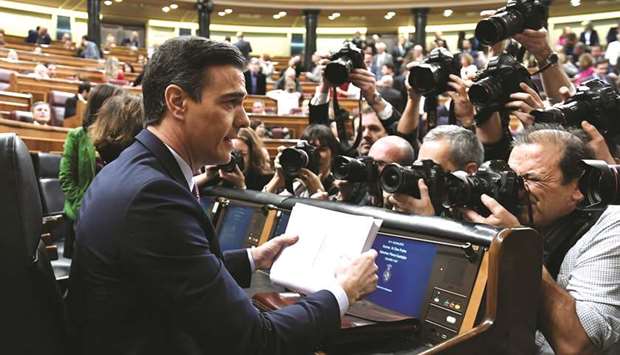Spain’s acting Prime Minister Pedro Sanchez, seeking parliament’s backing to form a government, pledged to resolve the Catalan dispute through dialogue as he received renewed support from separatists in the restive region.
As Sanchez set out his priorities yesterday in an attempt to end several months of political gridlock, he assured lawmakers that neither Spain nor its constitution would break.
“What is going to break is the blockade of a progressive government democratically elected by the Spanish people,” Sanchez told deputies in opening remarks as he kicked off several days of debates and votes in parliament.
Earlier this week, the Socialist Party leader Sanchez and Pablo Iglesias, the head of the far-left party Unidas Podemos, restated their intention to form the first coalition government in Spain’s recent history.
Since the two parties together fall short of a majority with 155 seats in a 350-member parliament, victory for Sanchez hinges on the votes of small regional parties.
Catalonia’s largest separatist party, Esquerra Republicana de Catalunya (ERC), confirmed yesterday that it would abstain rather than vote against Sanchez in the second and decisive vote on Tuesday.
The party’s support had been called into question by a last-minute decision by Spain’s electoral board on Friday to block ERC’s jailed leader Oriol Junqueras from becoming a member of the European Parliament.
The board also decided to strip the head of Catalonia’s pro-independence regional chief Quim Torra – an ERC ally – of his position as a regional lawmaker.
Yesterday the leader of the conservative People’s Party (PP), Pablo Casado, said that Sanchez should ensure the decision to unseat Torra in Catalonia was enforced.
“Surrendering to the worst radicals may make you prime minister, but you will not be able to govern,” Casado said during the debate.
Tensions over Catalonia highlight the struggles a Socialist-led minority government would have to pass legislation as it would depend on the support or abstention of small regional parties with competing agendas.
A few hundred people joined a rally in Madrid yesterday calling for a “united Spain” and the leader of the far-right party Vox, Santiago Abascal, demanded Torra be arrested.
Meanwhile, the Catalan parliament was due to convene for a special session following the electoral board decision.
Sanchez said he wanted to resume dialogue over Catalonia’s future rather than hammer out the dispute through Spain’s courts, but said he would address the issues within Spain’s constitutional framework.
The constitution prohibits regions from breaking away and the Catalan independence drive, including a banned referendum in 2017, has triggered Spain’s worst political crisis in decades.
Among his priorities, Sanchez mentioned increases in corporate tax, more worker-friendly labour legislation, and fighting climate change.
He pledged to lift the minimum wage to 60% of average national wages by the end of the government’s four-year term.
Sanchez is not expected to win the first confidence vote today, in which he would require an absolute majority of 176 members among all 350 lawmakers in the Spanish parliament.
But he aims to win a second vote on Tuesday which would only require him to obtain more votes in favour than against.

Media representatives take pictures of Sanchez before the investiture debate at the parliament in Madrid.
